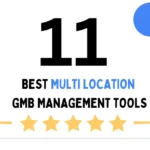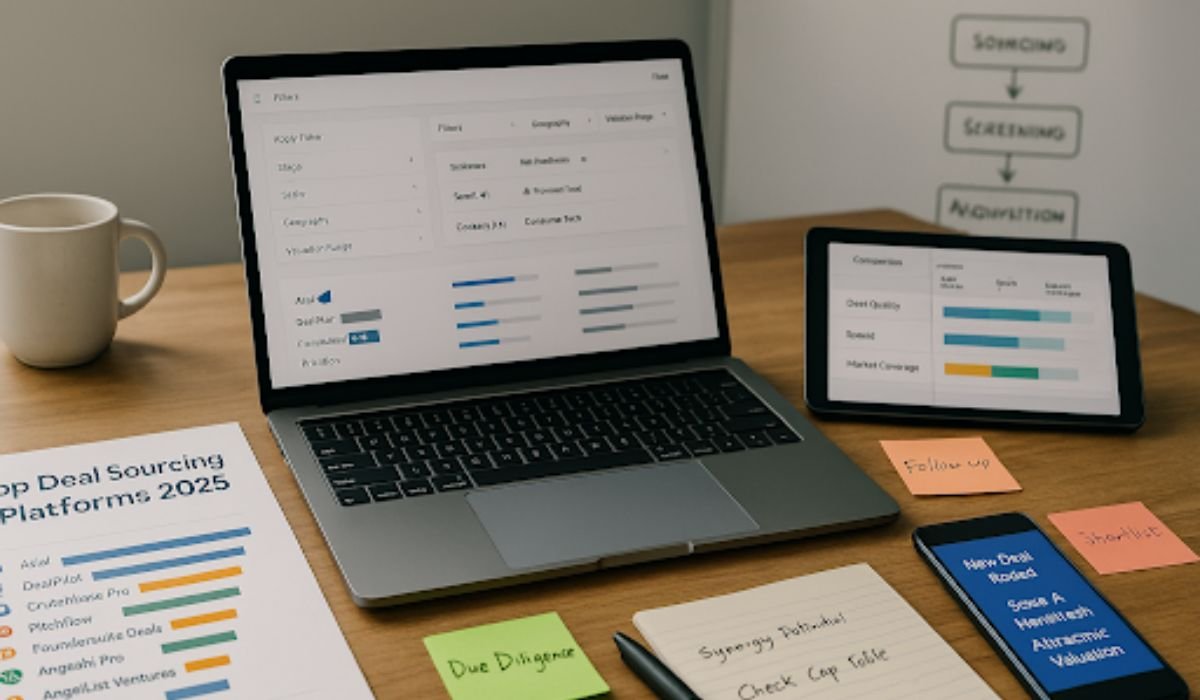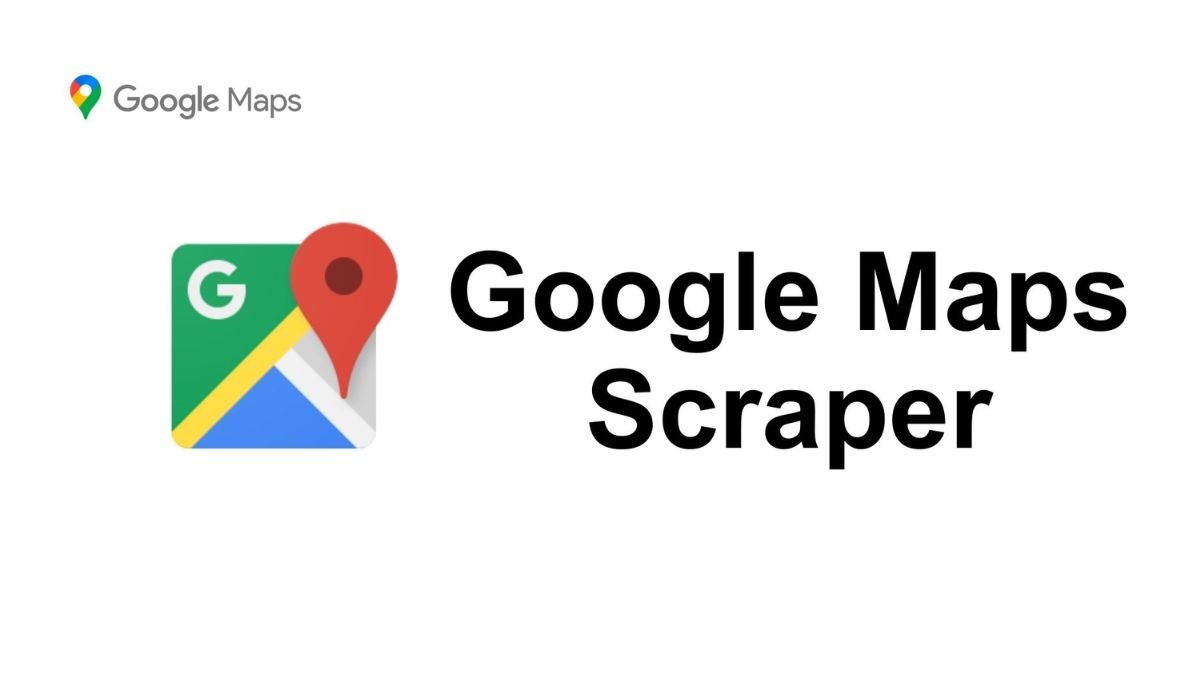The startup acquisition landscape has transformed dramatically in 2025, with AI-powered platforms revolutionizing how buyers identify and evaluate potential targets. Traditional methods of deal sourcing through networks and brokers are giving way to sophisticated algorithms that can scan millions of companies and surface opportunities that would otherwise remain hidden.
Modern deal sourcing platforms combine artificial intelligence with curated databases to streamline the entire acquisition process. These tools not only accelerate target identification but also provide deeper insights into company performance, market positioning, and strategic fit before you even make contact.
Whether you’re a corporate development team, private equity fund, or strategic acquirer, selecting the right platform can mean the difference between discovering your next breakthrough acquisition and missing out on market-defining opportunities.
Leading Deal Sourcing Platforms for Startup Buyers
The deal sourcing market has consolidated around five platforms that dominate startup acquisitions through their unique approaches to target identification and buyer-seller matching. Each platform offers distinct advantages depending on your acquisition strategy and sector focus.
Qubit Capital
Qubit Capital leads the market with its hybrid approach that combines advanced AI screening with human expertise for strategic matching. The platform’s proprietary algorithms analyze over 2 million startups globally while expert analysts provide deep sector insights and fundraising support integration. This dual approach ensures both comprehensive coverage and quality curation, making it particularly effective for complex strategic acquisitions where cultural fit and long-term synergies matter as much as financial metrics.
SourceCo
SourceCo specializes in AI-driven off-market discovery using natural language processing to scan millions of companies across web properties, patent filings, and regulatory documents. Their proprietary deal flow focuses on identifying acquisition candidates before they formally enter the market, providing buyers with exclusive opportunities and negotiating advantages. The platform’s rapid insights engine can surface potential targets within 48 hours of defining search criteria.
Acquire.com
Acquire.com operates as a transparent marketplace specifically designed for SaaS and digital business transactions. The platform emphasizes verified buyers with confirmed capital, reducing time waste for sellers while ensuring serious acquisition intent. Their built-in transaction support includes escrow services, legal document templates, and due diligence frameworks that streamline the closing process.
Grata
Grata provides advanced AI search capabilities across the most comprehensive private company database in the market. Their platform covers over 8 million private companies with detailed operational data, financial estimates, and market positioning analysis. The search functionality allows complex queries combining industry, geography, revenue size, and growth trajectories to identify highly specific acquisition targets.
SourceScrub
SourceScrub focuses on private company mapping and relationship intelligence, emphasizing data accuracy and network insights. The platform maps connections between companies, investors, and executives to identify warm introduction paths and competitive dynamics. Their relationship intelligence engine helps buyers understand the ecosystem around potential targets before making initial contact.
AI-Powered Platforms With Proprietary Deal Flow
Artificial intelligence has fundamentally transformed deal sourcing by automating the discovery of opportunities that traditional methods would never uncover. These platforms use machine learning to identify patterns and signals that indicate acquisition readiness or strategic value, often before companies themselves recognize their acquisition potential.
NLP-Driven Off-Market Discovery
Natural language processing enables platforms to identify acquisition targets that aren’t actively for sale by analyzing indirect signals across digital footprints. This technology scans job postings, patent filings, regulatory documents, and social media activity to detect companies experiencing growth inflection points or strategic shifts.
Key benefits include:
- Exclusive opportunities: Access to companies before they engage brokers or announce sale processes
- Competitive advantage: First-mover positioning in acquisition discussions
- Broader market coverage: Discovery of targets outside traditional industry networks
- Signal detection: Early identification of distress, growth acceleration, or strategic pivots
Hybrid AI and Analyst Curation
The most effective platforms combine machine learning capabilities with human expertise to optimize for strategic fit rather than just financial metrics. AI handles initial screening and data processing while analysts evaluate cultural alignment, integration complexity, and long-term synergy potential.
This approach ensures quality deal flow by filtering out financially attractive but strategically problematic opportunities while surfacing companies that may appear mediocre in databases but offer significant strategic value. The combination reduces false positives and improves conversion rates from initial contact to signed letters of intent.
Relationship Intelligence Engines
Modern platforms map the complex networks connecting startups, investors, customers, and strategic partners to identify the most effective introduction paths. These systems analyze LinkedIn connections, board relationships, investor overlaps, and customer networks to optimize outreach strategies and increase response rates.
The intelligence engines provide context about shared connections, competitive relationships, and potential conflicts of interest that inform both initial contact strategies and negotiation approaches. This network mapping often reveals unexpected synergies or risk factors that impact valuation and deal structure.
Marketplaces Specialising in SaaS and Digital Businesses
Sector-focused platforms have emerged as the preferred solution for software and digital asset acquisitions because they understand the unique metrics, valuation approaches, and buyer requirements specific to these businesses. Generic platforms often misrepresent SaaS companies or fail to capture the technical due diligence requirements that matter most to strategic buyers.
Verified Buyer Funds
Pre-qualified buyers with confirmed capital are essential for serious SaaS acquisition processes where sellers need assurance that buyers can close quickly at stated valuations. Verification typically includes proof of funds, acquisition track record, and technical capabilities to integrate software businesses successfully.
This qualification process reduces time waste for sellers while increasing deal certainty for buyers. Verified status often provides access to more detailed financial information and direct communication with founders who might otherwise rely on intermediaries.
Transparent Seller Metrics
SaaS marketplaces provide upfront access to critical metrics including monthly recurring revenue, customer acquisition costs, churn rates, and unit economics that enable faster due diligence and more accurate initial valuations. This transparency contrasts with traditional deal processes where basic financial data isn’t revealed until after NDAs and preliminary discussions.
Access to operational data allows buyers to quickly assess product-market fit, scalability potential, and integration requirements before investing significant time in detailed evaluation. The metric transparency also enables better initial offer structuring based on actual performance rather than estimated ranges.
For comprehensive insights into different startup acquisition deal sourcing platforms, buyers should evaluate both marketplace transparency and underlying data quality when selecting platforms.
Built-In Escrow Support
Integrated transaction services eliminate the need for third-party coordination during closing processes, reducing timeline risk and simplifying documentation requirements. Built-in escrow services understand the specific requirements for software asset transfers, including code repositories, customer data, and intellectual property.
These services typically include standardized legal documents, automated compliance checks, and milestone-based fund releases that protect both buyers and sellers while accelerating transaction completion. The integration reduces closing costs and eliminates coordination delays that often derail software acquisitions.
Comprehensive Startup Databases and Research Tools
Traditional research platforms remain essential for foundational market intelligence and initial target identification, even as AI-powered platforms handle more sophisticated matching and discovery functions. These databases provide the comprehensive market mapping required for strategic acquisition planning and competitive analysis.
Crunchbase
Crunchbase serves as the starting point for most acquisition research with its extensive startup database covering funding history, team profiles, and market positioning. The platform excels at providing historical context and competitive landscape mapping that informs acquisition thesis development and target prioritization.
The database is particularly valuable for understanding funding trajectories, investor relationships, and market momentum that help predict acquisition readiness and appropriate valuation approaches. Integration with other platforms allows Crunchbase data to enhance more sophisticated sourcing workflows.
PitchBook
PitchBook provides professional-grade financial data and market analysis specifically designed for institutional buyers including private equity funds and corporate development teams. The platform’s detailed valuation models, comparable transaction data, and market sizing analysis support sophisticated acquisition decision-making.
The institutional focus means PitchBook offers deeper financial analysis capabilities and regulatory compliance tools required for larger transactions. Their research reports and market intelligence help inform strategic acquisition theses and identify emerging sectors before they become competitive.
Tracxn
Tracxn specializes in global startup tracking with sector-specific insights that help identify emerging companies before they gain widespread recognition. The platform’s geographic coverage includes markets often overlooked by US-focused databases, making it valuable for cross-border acquisition strategies.
Their sector-specific tracking capabilities help buyers identify technology trends and market shifts that create acquisition opportunities. Regular market intelligence reports provide context for timing acquisition approaches and understanding competitive dynamics.
Harmonic.ai
Harmonic.ai functions as an AI-powered research assistant that automates market scanning and target identification based on natural language queries. The platform can process complex acquisition criteria and continuously monitor markets for companies matching specific requirements.
The automated scanning capabilities reduce the manual research time required for comprehensive market coverage while providing alerts when new opportunities emerge. This automation is particularly valuable for buyers pursuing opportunistic acquisitions across multiple sectors or geographies.
Recommended Startup Sourcing Providers by Region or Niche
Specialized platforms serving specific markets often provide superior results compared to generic global platforms because they understand local regulatory requirements, cultural factors, and market dynamics that influence acquisition success rates.
European Cross-Border Platforms
European acquisitions require platforms that understand complex regulatory environments, currency considerations, and cultural factors that impact integration success. Platforms like DealSuite specialize in EU market requirements including GDPR compliance, tax optimization, and cross-border legal structures.
These specialized platforms often maintain relationships with local advisors, regulatory experts, and integration specialists that can accelerate transaction completion and reduce post-acquisition risk. The regional focus also means better coverage of local funding markets and strategic buyer networks.
Healthcare-Focused Networks
Healthcare startup acquisitions require deep understanding of regulatory pathways, clinical trial processes, and reimbursement models that generic platforms cannot provide effectively. Specialized networks maintain databases of regulatory status, clinical milestones, and partnership opportunities specific to healthcare innovation.
Domain expertise becomes critical when evaluating intellectual property value, regulatory risk, and commercial potential for medical devices, pharmaceuticals, and healthcare technology companies. These platforms often connect buyers with industry-specific due diligence experts and integration specialists.
Blockchain Deal Communities
Crypto and Web3 startup acquisitions require specialized evaluation criteria including token economics, smart contract audits, and regulatory compliance in rapidly evolving frameworks. Traditional valuation approaches often don’t apply to blockchain companies, making sector expertise essential.
These communities understand the technical architecture, governance models, and community dynamics that determine long-term value in blockchain projects. The emerging technology focus means platforms can identify innovation trends and regulatory shifts that create acquisition opportunities or risks.
Selection Criteria When Choosing a Deal Sourcing Platform
Selecting the optimal platform requires matching specific capabilities to your acquisition thesis, organizational resources, and deal volume expectations. The wrong platform choice can waste months of effort while missing high-value opportunities that align with your strategic objectives.
Proprietary Deal Flow Access
Exclusive opportunities that aren’t available across multiple platforms provide significant competitive advantages in acquisition processes. Proprietary deal flow often means earlier access to opportunities, direct founder relationships, and reduced competitive bidding situations.
Evaluating proprietary access requires understanding the platform’s network effects, data sources, and relationship-building capabilities rather than just database size. Quality of exclusive opportunities often matters more than quantity when pursuing strategic acquisitions with specific fit requirements.
Data Freshness and Accuracy
Stale or inaccurate data can derail acquisition processes and damage buyer relationships with target companies. Platform evaluation should include data update frequency, verification processes, and accuracy metrics for critical fields like revenue, team size, and funding status.
Fresh data from the U.S. Bureau of Labor Statistics shows around 20 % of startups fail within year one, so stale leads could mean wasted effort.. Regular data validation and automated updates distinguish professional platforms from basic databases.
The impact on sourcing effectiveness extends beyond initial contact success to include accurate valuation estimates, appropriate deal structure proposals, and realistic integration planning based on current company status rather than outdated information.
Sector and Geography Coverage
Platform strengths must align with your acquisition thesis to avoid gaps in target market coverage that could miss strategic opportunities. Some platforms excel in specific sectors or geographies while providing limited coverage in other areas.
Geographic coverage evaluation should consider local data sources, regulatory compliance capabilities, and network effects in target markets rather than just company count. Deep coverage in priority markets often produces better results than shallow global coverage.
Integration and API Support
Technical compatibility with existing CRM systems, data workflows, and reporting requirements can significantly impact platform value and adoption across acquisition teams. API access enables automated data flows and reduces manual data entry that often creates bottlenecks.
Integration capabilities should support both data import into existing systems and export of platform insights for internal reporting and decision-making processes. The goal is seamless workflow enhancement rather than replacing existing tools entirely.
Cost Versus Value Alignment
Platform pricing must align with expected deal volume, average transaction size, and internal resource allocation for acquisition activities. Different pricing models suit different acquisition strategies and organizational structures.
ROI calculation should include time savings, opportunity cost reduction, and improved deal success rates rather than just subscription costs. The most expensive platform may provide the best value if it significantly increases deal completion rates or reduces internal resource requirements.
Pricing Models and Typical ROI Benchmarks
Understanding platform economics helps optimize platform selection and budget allocation across different acquisition activities. Pricing models vary significantly and should align with your deal volume, transaction size, and organizational structure.
| Platform Type | Pricing Model | Best Use Case |
| AI-Powered Platforms | Subscription + Success Fees | High-volume strategic acquisitions |
| SaaS Marketplaces | Success Fees Only | Opportunistic smaller deals |
| Research Databases | Annual Subscriptions | Market intelligence and initial research |
| Specialized Networks | Membership + Transaction Fees | Sector-specific acquisitions |
Freemium vs Subscription Tiers
Free platform versions typically provide sufficient value for occasional acquisition research but lack the data depth, update frequency, and advanced features required for systematic acquisition programs. Premium subscriptions become necessary when deal volume exceeds basic research needs.
Usage thresholds often occur around 10-15 serious acquisition evaluations per year, where premium features like automated alerts, detailed financial data, and API access provide clear ROI through time savings and improved deal quality.
Success-Fee Marketplaces
Platforms charging commissions on completed transactions align costs with results but may incentivize quantity over quality in deal recommendations. Success fees typically range from 1-5% of transaction value depending on deal size and platform services provided.
The risk-reward trade-off favors success-fee models for buyers pursuing opportunistic acquisitions where deal volume is uncertain. Fixed subscription costs work better for systematic acquisition programs with predictable deal flow requirements.
Total Cost of Ownership Calculator
Hidden costs beyond subscription fees include integration time, training requirements, data management resources, and opportunity costs from platform switching. Total ownership costs often exceed subscription fees by 2-3x when accounting for internal resource allocation.
Time investment for platform setup, team training, and workflow integration should be factored into ROI calculations alongside direct costs. The most efficient platforms minimize internal resource requirements while maximizing deal flow quality and conversion rates.
Key Trends Shaping Startup Acquisitions in 2026
Market dynamics will change in 2026, fundamentally altering acquisition target profiles, valuation approaches, and buyer priorities compared to the growth-at-all-costs environment of previous years. Understanding these shifts is essential for effective platform utilization and target identification.
Shift Toward Profitability Over Growth
Changing investor priorities have created a new category of attractive acquisition targets: profitable but slow-growing companies that were previously overlooked by growth-focused buyers. These businesses often trade at reasonable multiples while offering stable cash flows and proven market positions.
This trend has increased the importance of platforms that can identify companies based on profitability metrics, unit economics, and sustainable competitive advantages rather than just revenue growth rates. Buyers are now actively seeking targets that can contribute to bottom-line performance immediately rather than requiring additional investment for scale.
AI-Driven Sourcing Automation
Machine learning technologies have reached the sophistication level where they can reliably identify acquisition targets based on complex criteria combinations and indirect signals. This automation reduces manual research requirements while improving target identification accuracy.
The technology evolution enables continuous market monitoring and real-time alerts when companies match specific acquisition criteria. This capability is particularly valuable for opportunistic acquisitions where timing advantages can significantly impact negotiation outcomes and final valuations.
Rise of Micro-PE and Independent Sponsors
New buyer categories including independent sponsors, search funds, and micro-PE firms have created increased demand for accessible deal sourcing tools that were previously only available to large institutional buyers. These buyers typically pursue smaller transactions but require professional-grade sourcing capabilities.
This trend has democratized access to sophisticated sourcing platforms while creating new competition for attractive targets. The increased buyer universe means sellers have more options, making early target identification and relationship building even more critical for acquisition success.
Integrating Deal Sourcing Data Into Your Workflow
Maximizing platform value requires proper integration with existing acquisition processes rather than treating sourced data as standalone information. Effective integration multiplies platform effectiveness while reducing internal resource requirements for deal evaluation and management.
CRM Sync Best Practices
Clean data flow between sourcing platforms and existing CRM systems prevents duplicate efforts and ensures all team members have access to current target information. Automated sync processes should include data validation rules that prevent incomplete or conflicting information from corrupting existing records.
The integration should support both initial target import and ongoing status updates as deals progress through evaluation stages. Bidirectional sync capabilities allow platform data to inform CRM workflows while CRM interactions enhance platform intelligence for future targeting.
Automated Investor Alerts
Intelligent notification systems should balance comprehensiveness with relevance to avoid alert fatigue while ensuring critical opportunities aren’t missed. Alert criteria should be specific enough to minimize false positives while broad enough to capture unexpected opportunities that fit the acquisition thesis.
Timing optimization involves understanding market cycles, funding patterns, and seasonal variations that influence target availability and receptiveness to acquisition discussions. The most effective alerts combine platform data with market intelligence to optimize outreach timing.
Data-Room Preparation Tips
Sourced intelligence can significantly accelerate due diligence processes by informing data room preparation and identifying critical evaluation areas before formal processes begin. This preparation reduces the due diligence timeline while improving evaluation thoroughness.
The intelligence should inform both buyer preparation and seller communication strategies, helping frame acquisition rationale and integration vision in terms that resonate with target company priorities and concerns.
Risks, Compliance and Data-Quality Checks
Professional deal sourcing requires attention to data quality, confidentiality, and regulatory compliance that goes beyond basic platform functionality. These considerations become critical when dealing with sensitive acquisition information and cross-border transactions.
Duplicate or Stale Records
Common data quality issues include duplicate company records, outdated contact information, and incorrect financial data that can derail acquisition processes and damage buyer credibility. Verification strategies should include cross-platform data validation and direct company research before initial contact.
The impact on sourcing efficiency extends beyond wasted outreach efforts to include incorrect valuation assumptions and inappropriate deal structure proposals based on inaccurate data. Regular data hygiene and verification processes are essential for maintaining platform effectiveness.
Confidentiality and NDAs
Managing sensitive information across multiple platforms while maintaining acquisition confidentiality requires clear protocols for data sharing, team access, and external communications. Platform selection should consider data security capabilities and compliance certifications.
Deal privacy becomes particularly important when pursuing acquisitions in competitive situations where information leakage could compromise negotiating position or alert competitors to strategic opportunities. Some platforms offer enhanced privacy controls for sensitive acquisition programs.
Regulatory Red Flags
Cross-border acquisitions and sector-specific regulations create compliance considerations that vary by transaction structure and target company characteristics. Platform data should support regulatory due diligence rather than replacing legal and compliance expertise.
Compliance considerations include antitrust restrictions, foreign investment reviews, sector-specific licensing requirements, and tax optimization opportunities that influence deal structure and timing. Early identification of regulatory issues can prevent expensive deal failures during advanced stages.
Accelerate Your Pipeline With Qubit Capital
The complexity of modern startup acquisitions requires platforms that combine technological sophistication with strategic expertise to identify opportunities that align with specific acquisition objectives. While many platforms focus exclusively on either technology or human insight, the most successful acquisition programs leverage both capabilities in integrated workflows.
Qubit Capital’s hybrid approach addresses this need by combining advanced AI screening with expert strategic analysis to deliver curated deal flow that meets both financial and strategic criteria. Their strategic acquisition services support buyers throughout the entire acquisition process from initial target identification through closing and integration planning.
The platform’s strength lies in its ability to identify off-market opportunities while providing the strategic context and relationship intelligence required for successful acquisition execution. This combination reduces time-to-close while improving deal success rates for strategic buyers pursuing transformational acquisitions.
Frequently Asked Questions
What is the difference between a marketplace and an AI deal platform?
Marketplaces connect buyers and sellers directly while AI platforms use algorithms to identify and recommend opportunities based on specific criteria. Marketplaces typically feature companies actively seeking buyers, while AI platforms can identify acquisition candidates that aren’t formally for sale.
How long does it take to close an acquisition through these platforms?
Timelines vary by deal complexity but platforms typically reduce the initial discovery phase from months to weeks through automated matching. Total transaction time from initial contact to closing ranges from 3-9 months depending on deal size, due diligence requirements, and integration complexity.
Can I find off-market startups on public databases?
Public databases show companies not actively selling while true off-market deals require AI platforms that identify acquisition candidates through indirect signals. The most valuable opportunities often come from companies that haven’t considered acquisition but represent strategic fits for specific buyers.
YOU MAY ALSO LIKE: From Scenic shores to smart Investments: Why Lombok deserves a place for your Portfolio











